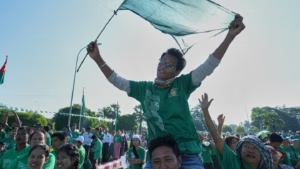A new UN Cybercrime Treaty, poised to be adopted by the UN General Assembly later this year, is drawing intense criticism from over 100 human rights activists and civil society organizations (CSOs). These groups argue that the treaty could become a powerful tool for government repression, raising significant concerns about its potential impact on human rights.
The treaty is expected to be approved by a UN Ad Hoc Committee later this week before moving to the 193-member General Assembly for final adoption. According to Deborah Brown, Deputy Director for Technology, Rights, and Investigations at Human Rights Watch (HRW), governments will then need to sign and ratify the treaty, which will involve national legislative processes. Brown warns that the treaty will likely face considerable scrutiny and pushback due to the perceived threats it poses to human rights.
Concerns Over Expanding Government Surveillance
One of the primary concerns highlighted by critics is that the treaty would expand government surveillance capabilities and create an unprecedented tool for cross-border cooperation on a wide range of crimes. However, there are fears that these new powers could be misused, leading to abuses of power without adequate safeguards to protect individual rights.
Brown emphasizes the need for caution: “Negotiations are also expected to start on a protocol to accompany the treaty to address additional crimes and further expand the treaty’s reach. We urge governments to reject a cybercrime treaty that undermines rights.”
While the UN acknowledges the growing threat of cybercrime and the need for a legally-binding international treaty, negotiations have been fraught with challenges. Five years after discussions began, member states have yet to reach a consensus, with the most recent meeting in February failing to produce an agreed draft. Countries remain divided on how to balance security concerns with human rights safeguards.
Risks of Broad Definitions and Lack of Safeguards
Access Now, a nongovernmental organization defending digital rights globally, has been actively involved in the treaty negotiations. Raman Jit Singh Chima, Senior International Counsel and Asia Pacific Policy Director for Access Now, expressed concerns that the treaty’s broad scope could criminalize political expression. For example, a comment about a head of government could be penalized under the proposed cybercrime laws.
Chima argues for a focused approach: “This treaty needs to address ‘core cybercrime’, namely those crimes that are possible only through a computer, such as hacking into computer systems and undermining the security of networks.” He stresses the importance of strong human rights standards to ensure trust and prevent the treaty from being used to suppress dissent.
A joint statement by CSOs further criticizes the draft treaty for its broad criminal provisions, inadequate human rights safeguards, and excessive cross-border information-sharing requirements, which could lead to intrusive surveillance. The statement highlights the misuse of cybercrime laws worldwide to target human rights defenders, journalists, and marginalized communities, raising alarms about the treaty’s potential to exacerbate these issues.
Change the World - Subscribe Now
Potential for Misuse and Global Implications
The treaty’s critics point to numerous instances where cybercrime laws have been misused to silence dissent and suppress free expression. In the Philippines, for example, the Cybercrime Prevention Act has been used to convict journalists and critics of the government. Similarly, in Tunisia and Jordan, cybercrime laws have been invoked to detain and harass individuals for their online activities.
Countries in the Middle East-North Africa region have also weaponized cybercrime laws to criminalize same-sex conduct and prosecute online speech. The broad scope of the treaty and the lack of human rights safeguards could enable similar abuses on a global scale.
A Call for Caution
Tirana Hassan, executive director of Human Rights Watch, has voiced strong opposition to the treaty, particularly its backing by Russia, which she argues is aimed at stifling dissent. Hassan warns that the treaty could facilitate government repression by expanding surveillance and enabling cross-border cooperation on a wide range of offenses, without adequate safeguards.
Hassan also points out that the treaty’s broad definition of cybercrime could allow governments to justify the enforcement of repressive laws. For example, behavior protected under international human rights law, such as criticizing the government or participating in protests, could be criminalized under the treaty.
The lack of human rights safeguards in the treaty is particularly concerning. Hassan highlights the recent case of Saudi Arabia, where peaceful online expression led to severe penalties, including death sentences. The new treaty could compel other governments to assist in such prosecutions, making them complicit in human rights violations.
Conclusion
As the UN Cybercrime Treaty moves closer to adoption, the concerns raised by human rights activists and CSOs cannot be ignored. While the treaty aims to address the growing threat of cybercrime, its potential to be used as a tool for government repression poses significant risks to human rights worldwide. The international community must carefully consider these implications and ensure that any treaty adopted includes robust safeguards to protect individual rights and freedoms.
IPS UN Bureau Report

 Follow SDG News on LinkedIn
Follow SDG News on LinkedIn











